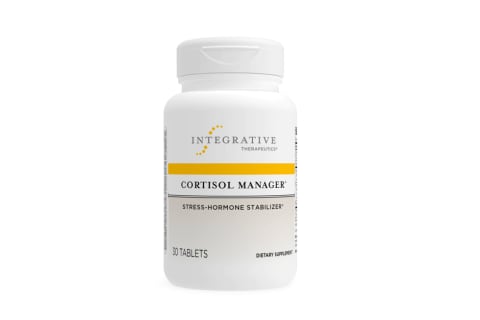Advertisement
This 7-Day Routine Will Help You Manage Stress Like An Expert

Stress is a natural part of life. Thanks to our survival response, we're literally wired for it. But that doesn't mean it should hold us back. In fact, stress can actually be a good thing.
In the face of stress, our adrenal glands release the steroid hormone cortisol, which activates the fight-or-flight response and increases concentration, energy, and focus. Think about all those college essays you left until the last minute—thanks to your stress response, procrastination paid off.
However, stress can also wreak havoc if left unchecked, impacting everything from sleep to relationships to productivity and more. And while it's impossible to eliminate stress altogether, simple steps to help manage stress go a long way, like daily support from Cortisol Manager®, a supplement from Integrative Therapeutics.* But we know it's also easier said than done (ironically, stress management can be stressful). That's why we turned to Kristina Hallett, Ph.D., for some expert intel. Using her tips, we created a simple seven-day challenge to help jump-start a more long-term routine.
Tackle stress in 7 days
Our biggest takeaway from Hallett was that stress management doesn't have to be difficult, and we can take it one day at a time. By adding one new practice per day over the course of one week, you'll end up with a whole toolbox of quick and easy stress management techniques that actually work. But don't take our word for it, put it to the test:
1. Add a supportive supplement.
The fight-or-flight response was particularly helpful in ancient times when life was simpler, but nowadays there are just too many triggers—from jammed carpool lines to late-night emails from your boss, to Netflix's new one-household rule (we didn't say they were justifiable triggers).
That's why adding a supplement, like Integrative Therapeutics' Cortisol Manager®, which supports balanced cortisol levels and a healthy stress response, can be a helpful addition to your stress management routine.* We can't always change the stress around us, but we can choose how we respond. With ongoing use, Cortisol Manager® can even reduce occasional sleeplessness disrupted by stress by promoting relaxation and calm.*
2. Bring more nature into your life.
Even if you don't have time for a full-on nature walk, Hallett recommends seeking out little bits of nature throughout your day—whether it's rolling down your car window to smell the fresh-cut grass or sneaking a peek at the field of flowers on your phone background. "If there's something that you can see or experience that brings out a sense of awe, that is really powerful."
3. Exercise self-compassion.
Next up on Hallett's list is self-compassion: "I would say that self-compassion is a skill. It's not a given. We literally have to practice it to get better at it." She recommends noticing your inner self-talk and then asking yourself whether it's the same language and tone that you would use toward someone you care about. If not, alter that dialogue to reflect how you would speak to your best friend.
4. Breathe.
As Hallett put it, "Nothing matters without breathing." Square breathing—also known as box breathing and 4-4-4-4 breathing—is her personal favorite. "It has an amazing impact that can massively decrease the physiological signs of stress that you're feeling," she explained. "That kind of breathing is not only oxygenating your brain, but it's saying to your brain that you are not in immediate danger."

5. Practice gratitude (the right way).
There is a lot of research out there on the benefits of gratitude and its ability to help mitigate the effects of stress. However, a lot of us are doing it wrong. A gratitude journal can be great if you're using it genuinely, but Hallett urges against using it like a "pro forma list." Instead, try making it into a somatic experience by involving smells or visuals that elicit the sense of awe mentioned in tip No. 1.
Personally, we like to turn this into a nighttime ritual. Once you're ready for bed, grab your favorite essential oil, close your eyes, and take a deep inhale as you marinate on one to three things you're grateful for. If you want to write them down, great! Just don't skip out on actually experiencing that feeling of gratitude. Bonus points if you take your Cortisol Manager® afterward and avoid post-ritual phone scrolling. It's the perfect way to unwind from the day and set yourself up for a good night's sleep.*
6. Take mini breaks.
"There is a limit to how much we can concentrate and focus even under the positive stress," Hallett explained, "and we have to have a break to keep our brain going at peak functioning." She suggests setting a timer every 50 to 60 minutes and forcing yourself to get up for five minutes when that timer goes off—even if it's just to go to the bathroom or grab a glass of water.
7. Connect with someone who makes you laugh.
The last tip of our seven-day challenge is to connect with someone in a positive way—emphasis on the positive. According to Hallett, having a moment for connection is even more powerful when laughter is involved because laughter helps to reduce cortisol. As Hallett explained, "Laughter is letting us have (literally) a breath of air"—even better if it's fresh air.
The takeaway
There's no shortage of tools available when it comes to stress management—but not all of us have the time, patience, or energy to go for an hourlong run or sit for a 30-minute meditation. Thankfully, there is a lot of value in the bite-sized practices. Supporting balanced cortisol levels with your daily Cortisol Manager® or taking a quick break to look at the trees outside your window doesn't require much effort—we just have to get into the habit of doing so.* Layering in one new practice at a time is a great way to start, and, thanks to Hallett, we have the perfect program all mapped.

